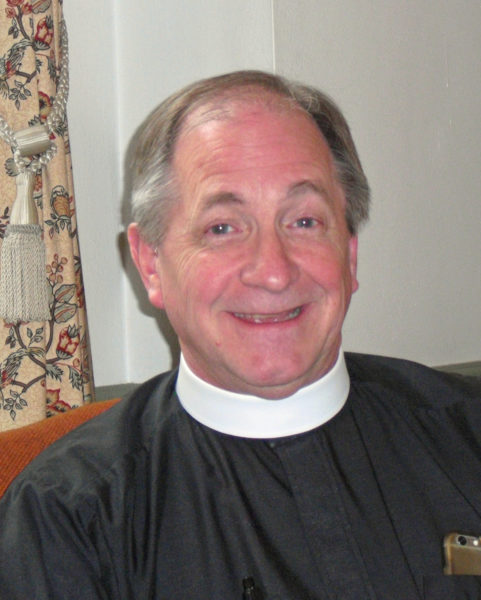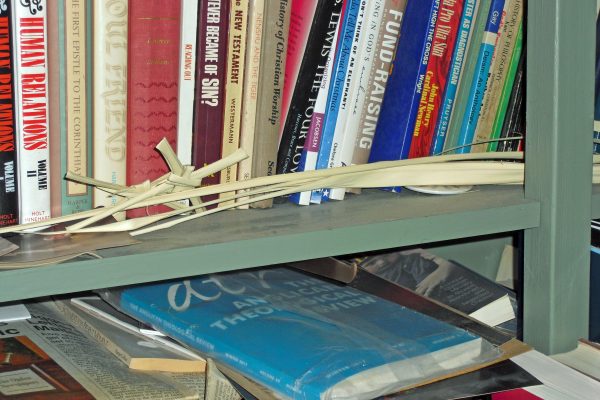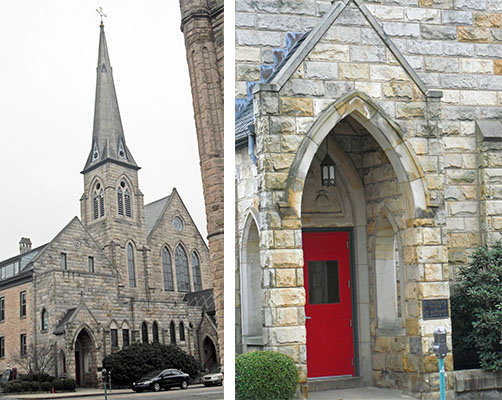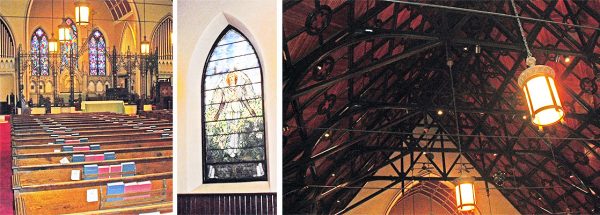Editor’s note: The Lenten/Easter season looms large in the Christian calendar. In today’s feature on Spirituality in the Ohio Valley, the rector of St. Matthew’s Episcopal Church shares his thoughts on getting the most from the ancient tradition of Lent, which begins today with Ash Wednesday.
 Giving up chocolate might sound like a good plan, but the Rev. Mark Seitz is hoping the faithful will dig a little deeper this Lenten season.
Giving up chocolate might sound like a good plan, but the Rev. Mark Seitz is hoping the faithful will dig a little deeper this Lenten season.
“I grew up with that tradition (of giving something up),” said Seitz, rector at St. Matthew’s Episcopal Church in the downtown. “I would really prefer the challenge of taking something on,” like a commitment to prayer.

Prayerfulness, in fact, is the focus of this year’s Lenten study series at the church. Five Wednesday nights of programming, open to the public and hosted by St. Matthew’s, look at such facets of prayer as what it is, praying scripture and praying the name of Jesus. (The church also hosts Lenten concerts for congregants and the community each Friday. See the full schedule for both series below.)
That adding-onto spirituality is what Lent is really about, Seitz said. Latin for “lengthening” and a reference to the growing natural light of the season, Lent is supposed to be a time of growing in spiritual light, as well.
A tradition of “giving up” can cloud that intention, he fears, especially if what is given up is actually a vice, like gossip.
“Are you going to go back to gossiping when Lent is over?” Seitz asked with an enthusiasm that suggests many of his sentences should be punctuated with exclamation points. “Or, when people will give up something like chocolate for Lent you have to ask: ‘What are we? What are we doing?’ It can get goofy.”
RENEW, REFRESH, RE-UP
Seitz believes it is important to consider what Lent actually is in order to have understanding of how to observe it.
“It’s 40 days of observance and preparation,” he said, noting Lent begins with Ash Wednesday, a day of repentance and mourning, and ends with the full-blown celebration of Easter. “Easter is what makes Christians Christian … the event out of which Christianity grows. Preparation makes sense, as this is the foundational event.”
While that preparation may have focused more on the people’s sinfulness and the need for repentance historically, Seitz said more modern observances of Lent speak of renewal and are likely to resemble a New Year’s resolution type of ideal.
“What Jesus calls us to is revolutionary and opposite to the ways the world behaves,” Seitz said of why renewal is key to contemporary Lenten thinking. “Have I lost track? Have I become more like the world than what I’m called to be?

The 40-day Lenten season, which excludes Sundays, looks to the same ideal in its symbolism, he said. Jesus spent 40 days in prayer and fasting in preparation for his ministerial launch. The number also connects to other periods of preparation and change in the Old Testament, he noted. These include the 40 years the Israelites traveled through wilderness before entering the Promised Land and the 40 days Moses spent on the mountain during the receiving of the Law.
“It’s behaving in the ways that the world knows nothing about,” he continued of a need for renewal. “It’s very easy to get back into the world.”
Refreshing that kind of focus during Lent is something that feels critical to Seitz in light of today’s cultural conflicts.
“(Christianity) changed the world. It changes your life,” Seitz said. “Who loves you? … Crazy Christians do! At least we’re called to and, to the best of our ability, we do it.”
He feels it’s easy in a polarized environment to not love, but said Lent is a perfect time to change that. “Someone’s got to stick their neck out and start doing it. How else are we going to get past this?”
A LONG HISTORY
If Christians have had centuries to tweak Lenten traditions, Seitz has also had plenty of time to think through such spiritual issues. Three generations of time. He and two of his three brothers are Episcopalian clergy. As were his father, two uncles and a grandfather.
That sense of history and continuity is also a factor at his current parish, of which he is now the longest serving rector at 23 years. Add to that the fact that St. Matthew’s congregation is celebrating its 200th anniversary, and Lent 2019’s studies and concerts take on a special glow, he added.
At one time, he said, such seasonal events rotated through all the Episcopalian churches in Ohio County. They eventually settled at St. Matthew’s, which was the easiest to access given the vagaries of late-winter weather.
The two series are now jointly sponsored by all these churches, which currently include Lawrencefield on GC&P Road, St. Luke’s on Wheeling Island and St. John’s Chapel in Woodsdale. Seitz laughed heartily at an ironic twist this brings. In spite of a fasting tradition also associated with Lent, church attendees actually eat as a group most often at this time. Each study evening and concert lunch is accompanied by a simple meal of soup and a beverage.

A SPIRITUAL RHYTHM
While Lent may be one of the most widely known seasons of liturgical Christianity, Seitz said it is only one part of the church year.
With each Advent season (the time of preparation for Christmas), a new ecclesiastical year begins, he explained. Between Advent and Easter, scripture readings and prayers track the birth, life, death and resurrection of Christ. The remainder of the year is dedicated to what Seitz refers to as the, “What now?” side of Christianity.
Beyond that annual schedule, Seitz said all liturgical churches that follow the Revised Common Lectionary cycle through scriptures on a three-year calendar.
“There’s a rhythm to that,” Seitz said. “We need that rhythm (in) nurturing a life of faith.”
In addition to its regular services, St. Matthew’s Episcopal Church and sister churches from that denomination host a full slate of Lenten activities that are open to the community, as well as congregants. All take place at St. Matthew’s, 1410 Chapline St., and include:
• Lenten Study Series
There will be five Wednesday evenings devoted to the study of prayer. The church will provide a light dinner of soup and beverage each program night at 6 p.m. (Participants are welcome to bring a supplemental sandwich if desired.) Talks will follow from 6:30-7:30 p.m.
Topics include: “What is Prayer?” on March 13; “Praying The Book of Common Prayer” on March 20; “Praying the Bible” on March 27; “Praying the Name: The Jesus Prayer” on April 3; and “Praying Wordlessly: The Prayer of Listening” on April 10. The presenter for all sessions is the Rev. Dr. Bonnie Thurston.

• Lenten Concert Series
During lunch hours on Lenten Fridays, there will music, as well. Concerts feature St. Matthew’s organist Robert Troeger and others. Music begins at 12:05 p.m. and is followed by a light lunch at 12:35 in the parish hall.
Concerts include: pianist John Alan Rose of St. Clairsville on March 8; organist Troeger and vocalist Jake Steele of Christ United Methodist Church on March 15; Chad Carter and Katie Shaffer of the Roman Catholic Diocese of Wheeling-Charleston, handbells and flute, on March 22; pianist Gerald Lee, West Liberty University faculty, on March 29; organist Jacob Minns of Peru, Indiana on April 5; and organist Wesley Parrott of the Philadelphia Episcopal Cathedral on April 12.
On Good Friday, April 19, the St. Matthew’s Parish Choir will sing Maurice Duruflè’s Requiem at 11:15 a.m.
• Nora Edinger writes from Wheeling, W.Va., where she is part of a three-generation, two-species household. A long-time journalist, she now writes in a variety of print and e-venues, including her JOY Journal blog at noraedinger.com. Her first work of fiction, a Christian beach read called “Dune Girl,” is available on Amazon Kindle.


